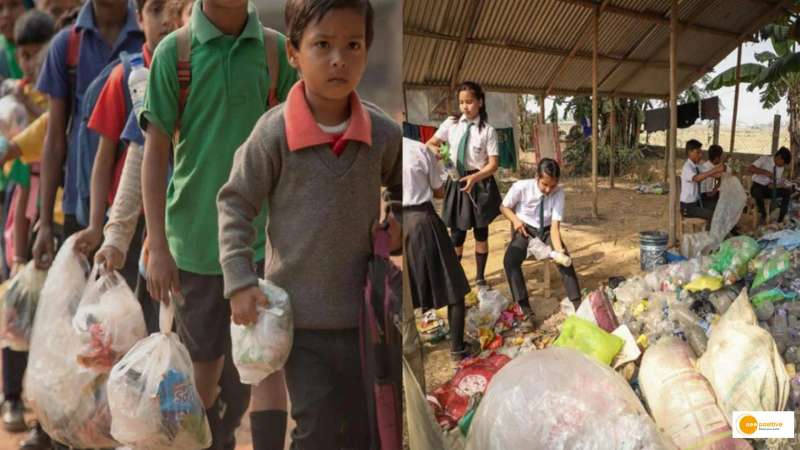

It is not uncommon for children to arrive at school with bags. Normally, you’d expect them to be crammed with books. Students at one Indian school, however, are arriving with trash bags.
The country has a problem with plastic waste, producing 26,000 tonnes of it every day. People in Pamohi, Assam’s northeastern state, had taken to burning it to keep warm during the harsh winters of the Himalayan foothills.
However, when Parmita Sarma and Mazin Mukhtar arrived in the area three years ago and established the Akshar Foundation School, they came up with an innovative idea: asking parents to pay their children’s school fees with plastic waste.
Mukhtar left his job as an aero engineer to work with disadvantaged families in the United States before returning to India and meeting Sarma, a social work graduate.
Plastic waste “fees”
They came up with the idea together, requesting that each child bring in at least 25 items each week. Although the foundation is a non-profit that relies on donations, it
claims that the plastic waste “fees” foster a sense of community ownership.
The school now has over 100 students. Not only is it assisting in the improvement of the local environment, but it has also begun to transform the lives of local families by addressing child labour.
Rather than dropping out of school at a young age to work in the local quarries for $2.50 per day, older students are paid to teach the school’s younger students. Their pay rises as they advance academically.
This allows families to keep their children in school for a longer period of time. Not only do the students learn how to manage money, but they also get a hands-on lesson in the financial benefits of obtaining an education.
Akshar’s curriculum combines practical training with traditional academic subjects, and is inspired by Mahatma Gandhi’s Nai Talim, or basic education, philosophy. The goal is to help teenagers finish high school and go on to college or an apprenticeship.
Learning how to install and operate solar panels, as well as helping to run the school’s landscaping business, which works to improve local public spaces, are examples of practical education. In addition, the school has partnered with an education technology charity to provide students with tablet computers and interactive learning materials to help them improve their digital literacy.
Outside of the classroom pupils run an animal shelter, too, rescuing and treating injured or abandoned dogs before finding them homes locally. And the school recycling centre produces eco-bricks that can be used for simple construction projects.
The founders have already taken their approach to the capital Delhi, helping turn around an under-performing school in just six months. Their Akshar School Reform Fellowship now plans to add five more schools next year, with one ultimate goal: transforming public schools in India.


